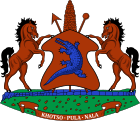| | |||||||||||||||||||||||||
| |||||||||||||||||||||||||
All 60 seats in the National Assembly 31 seats needed for a majority | |||||||||||||||||||||||||
| Turnout | 62.79% | ||||||||||||||||||||||||
|---|---|---|---|---|---|---|---|---|---|---|---|---|---|---|---|---|---|---|---|---|---|---|---|---|---|
This lists parties that won seats. See the complete results below. | |||||||||||||||||||||||||
 |
|---|
General elections were held in Basutoland on 29 April 1965. The result was a narrow victory for the Basotholand National Party, which led the country to independence as Lesotho on 4 October the following year. [1] Voter turnout was 63%. [2]